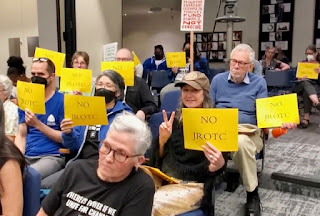Why establishing the U.S. Army Junior Reserve Officers’ Training Corps in Portland Public Schools must be opposed
The Portland Public Schools (PPS) Board of Education is considering bringing the U.S. Army Junior Reserve Officers' Training Corps (JROTC) into the district's high schools as one of the Career and Technical Education offerings. The JROTC is a Department of Defense-sponsored program in secondary schools in existence since 1916. The move to embed JROTC in Portland's schools must be opposed at minimum for the following reasons:
5. According to the Journal of American Medicine, military recruitment in schools is a matter of public health because "adults in the active military service are reported to experience increased mental health risk, including stress, substance abuse, and suicide." The outcomes are particularly troubling for youth, as "military service is associated with disproportionately poor health for the youngest soldiers."
Indeed, anywhere between 20-25 percent of Junior ROTC participants end up serving in the military. In fact, the Army has said that 44 percent of all soldiers who joined in recent years came from a school that offered the JROTC. The JROTC participants who don’t enlist, are still introduced to the military, which increases "the chances that they will recommend or 'influence' others to join in the future," according to the Army Times.
1. JROTC programs divert funding from public school budgets because they require public schools to share at least half the cost of the instructors's salaries and benefits. This is especially concerning during a fiscally challenging time that has led to budget cuts impacting staffing across the district.
2. The JROTC turns schools into sites of military recruitment and propaganda.
3. The U.S. Military is a perpetrator of violence, imperialism, and death around the world as well as the largest greenhouse gas emitter on the planet, and thus the largest institutional contributor to climate change. Financing and inviting into schools a program designed to expand the military contradicts the District's support of racial and social justice and its commitment to climate justice, outlined in the "PPS Climate Crisis Response,
Climate Justice and Sustainable
Practices Policy."
4. Young people are impressionable and the military uses sophisticated tactics to appeal to youth whose developing brains are not yet fully equipped to make informed decisions on issues with lifelong consequences. Moreover, teens from marginalized communities, specifically Black and Latinx as well as youth from poverty, are disproportionately targeted to join the military. The JROTC has a pattern of placing students into the program involuntarily. In fact, each school that decides to host the program has a quota to meet. The school must enroll at least ten percent of its population or at least 100 students, whichever number is smaller.
6. Sexual harassment and abuse of students by JROTC instructors have been found to be rampant with so little accountability that legislators only recently pushed through brand new federal legislation demanding greater accountability regarding the reporting of sexual misconduct allegations. Adding a program notorious for sexual abuse would add fuel to the flames; sexual harassment and assault are already commonplace occurrences with impunity within the halls, offices, classrooms, and restrooms of Portland Public Schools, as evidenced by two recently initiated lawsuits, one by a student's family and another by an educator. Increasing the risk of sexual abuse of students by allowing a military program notorious for sexual misconduct in our schools is reason enough to oppose the JROTC.
***
The amendment to the PPS military recruitment policy, which would allow the establishment of JROTC programs in the city's high schools, was discussed at the School Board meeting on April 2, 2024. Student representative Frankie Silverstein stated that the PPS Student Council has "a lot of concerns, specifically around how the military has a pattern of targeting folks of color or people below the poverty line." Silverstein also voiced a concern about the lack of student engagement on this issue. According to Silverstein, the Student Council's response to the idea of placing the JROTC in schools was overall "overwhelmingly negative."
The JROTC purports to focus on building character and teaching leadership skills. However, as the New York Times has stated, "Military leaders have viewed J.R.O.T.C. as a valuable recruiting tool, as students who encounter the program are more likely to enlist." By the Army's own admission, it the JROTC is largely a military public relations, recruitment and enculturation organization. As the Army, Air Force and Navy struggle to meet their enlistment goals during its "most severe recruiting crisis since the inception of the all-volunteer force (AVF) in 1973," the military seeks to "provide
favorable exposure to military careers through JROTC and
the program has potential to increase the propensity for
military service."
In its "Defense Primer: Junior Reserve Officers’ Training Corps," the Congressional Research Service states that "in 2020, the National Commission on Military, National, and Public Service called the JROTC a catalyst for increasing civic education and sparking interest in military service, and recommended expanding and strengthening the JROTC programs," with the goal 6,000 units by 2031. Currently there are just over 500,000 students in more than 3,500 units.
During the April 2 meeting, board director Herman Greene who was advocating for the JROTC asserted, "We are not talking about students going into the military," but rather about students being offered opportunities. As a response to vocal audience members opposing the military in schools, including veterans against the JROTC, Greene argued that only "facts" matter. He retorted, "Opinions are like underwear; everybody's got them. Not everybody wears them. Some of them are clean, some of them are dirty, but they're yours nonetheless. I don't care about your opinions!"
When asked whether community input was sought, the Board's response was that that has not yet happened.
Many questions still remain. Further discussion will take place during upcoming Board meetings this spring before the Board votes on the new military policy amendment allowing high schools to establish JORTC programs taught by military vets. Reasons abound, however, for why the JORTC in Portland Public Schools must be opposed.





Comments
Post a Comment